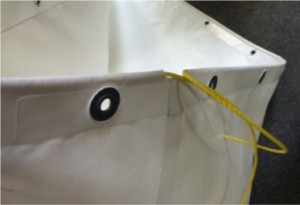 Proper installation is key to the effectiveness of water tank liners. These liners are tailored not only to fit the dimensions and shapes of specific tanks but also to accommodate features like inlets, outlets, and manways. Proper installation ensures that there are no gaps or misalignments that could compromise the liner’s effectiveness.
Proper installation is key to the effectiveness of water tank liners. These liners are tailored not only to fit the dimensions and shapes of specific tanks but also to accommodate features like inlets, outlets, and manways. Proper installation ensures that there are no gaps or misalignments that could compromise the liner’s effectiveness.
Case Studies: Successful Implementations of EPA-Compliant Tank Liners
Several case studies highlight the effectiveness of tank liners in ensuring compliance with EPA standards and providing safe drinking water.
Municipal Water Storage Upgrade:
Cities across the Midwest are facing significant challenges with their aging water storage infrastructure. Many of these municipalities rely on concrete tanks installed decades ago, which are now struggling to meet the stringent safety and quality standards set by the Environmental Protection Agency (EPA). These aging tanks have become susceptible to microbial and chemical contaminants, posing a risk to public health and violating EPA regulations.
Concrete water storage tanks, while initially durable, deteriorate over time. Cracks and porous surfaces in aging concrete allow contaminants to infiltrate the water supply. Additionally, these materials can leach chemicals into the water, compromising its safety and quality. Midwest cities are under increased pressure to address these issues to ensure safe drinking water for their residents and comply with EPA standards.
Agricultural Water Systems:
Farms often use various tanks for water storage that were not originally designed for potable water. By installing custom-fit PVC tank liners, several farms have been able to repurpose existing tanks to safely store drinking water for workers, meeting EPA guidelines.
These issues pose significant risks to the health of farm workers who rely on this water for drinking and other uses. Moreover, using non-compliant tanks can result in violations of EPA regulations, leading to potential fines and operational disruptions.
Industrial Retrofitting:
Imagine a large-scale manufacturing facility that uses unlined metal tanks for storing process water, which occasionally needs to be converted to potable use. In this hypothetical scenario, the facility could enhance its infrastructure by integrating custom-fit cistern liners into these tanks, each with capacities exceeding 50,000 gallons. Such an upgrade would be essential to meet EPA standards for potable water, ensuring compliance while providing operational flexibility. Installing these liners would not only help maintain water quality but also extend the lifespan of the existing tanks, showcasing a commitment to environmental standards and cost efficiency. This strategic upgrade would allow the facility to seamlessly switch between industrial and potable water uses as production demands change, exemplifying a proactive approach to resource management.
Choose Perfect Fit for EPA-Compliant Water Containment Solutions
As we consider the essential role of water tank liners in ensuring the purity and safety of drinking water, it’s clear that choosing the right partner for your water containment needs is crucial. CTO Enterprises offers a range of EPA-compliant, durable, and custom-fit solutions through their Perfect Fit Tank Liners brand that not only meet regulatory standards but also enhance the longevity and safety of your water systems. Whether you’re upgrading municipal water storage, ensuring safer agricultural water practices, or implementing industrial water systems, our expert team is equipped to provide top-tier, reliable liner solutions. Don’t compromise on water quality — contact Perfect Fit Tank Liners today to secure the best in water containment technology and safeguard your community’s health and well-being.
If you have questions or if you’d like more information about extending the life of your chemical tank, reach out to one of our experts at Perfect Fit Tank Liners.
Contact us today for all your tank liner needs! If you need immediate assistance give us a call at 708-479-5501
Website Accessibility
CTO Enterprises is committed to facilitating the accessibility and usability of its Website, www.perfectfittankliners.com, for all people with disabilities. If you use assistive technology (such as a Braille reader, a screen reader, or TTY) and the format of any material on this website interferes with your ability to access information, please contact us. If you do encounter an accessibility issue, please be sure to specify the Web page in your email, and we will make all reasonable efforts to make the page accessible for you. Users who need accessibility assistance can also contact us by phone at 1-708-479-5501 (voice). Our Website will be reviewed, tested, and improved on an ongoing basis.
